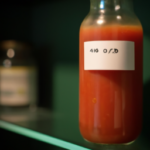Juice Tips and Tricks
How Long Fresh Juice Last In Fridge

In the realm of juicing, everyone strives to reap the benefits of freshly squeezed, nutritious juice. But what should we do if we make too much and can’t consume it all at once? This is where the significance of proper storage comes into play.
In this article, I’ll be discussing the importance of storing fresh juice correctly, how long it can last in the fridge, and tips for extending its shelf life.
Firstly, it’s crucial to understand that fresh juice is a perishable item that must be stored correctly to maintain its quality and safety. Improper storage can lead to spoilage, which can be harmful to your health.
That’s why it’s essential to know how long your fresh juice can last in the fridge and how to store it correctly to ensure it stays fresh and safe to drink. So, let’s dive into the specifics of fresh juice storage and how to keep your juice fresh for as long as possible.
Key Takeaways
- Fresh juice should be stored in airtight containers in the coldest part of the fridge to prevent spoilage.
- The recommended temperature range for storing fresh juice is between 32°F and 41°F to avoid exposure to factors that can affect its shelf life.
- Adding citrus or honey to fresh juice can increase acidity and natural antimicrobial properties to preserve it for a longer period of time.
- Store-bought juice often contains added sugars and preservatives that can be harmful to health, while homemade juice can be made with fresh and natural ingredients, making it a healthier option.
The Importance of Proper Juice Storage
Proper juice storage is crucial to ensure it stays fresh and tasty in the fridge! If you don’t store your juice properly, it can quickly spoil, losing its nutritional value and becoming a potential health hazard.
That’s why understanding key tips for proper juice storage and preventing spoilage are essential steps to take. One of the key tips for proper juice storage is to keep it in an airtight container. This helps prevent exposure to oxygen, which can cause the juice to spoil quickly. Additionally, it’s important to store the juice in the coldest part of the fridge, such as the back of the bottom shelf.
This ensures that the juice stays at a consistent temperature and doesn’t experience any fluctuations that could lead to spoilage. By following these simple steps, you can help ensure that your juice stays fresh and delicious for as long as possible.
Understanding the shelf life of fresh juice is crucial for anyone who wants to enjoy it for an extended period of time.
Understanding the Shelf Life of Fresh Juice
You can maximize the deliciousness of your homemade juice by understanding how to extend its lifespan. There are a few ways to prolong the shelf life of fresh juice.
One way is to use a slow juicer instead of a centrifugal juicer. Slow juicers use a masticating process that generates less heat, resulting in juice that lasts longer. Additionally, using airtight containers or vacuum sealing your juice can also help keep it fresh for a longer period of time.
Testing freshness is also a crucial aspect of understanding the shelf life of fresh juice. A simple way to test the freshness of your juice is to smell it. If it smells sour or has a funky odor, it’s likely past its prime. Another way to test freshness is to look at the color. If the juice has started to oxidize, it’ll become darker in color.
By understanding how to prolong the shelf life of fresh juice and testing its freshness, you can enjoy your homemade juices for longer periods of time. Now, let’s move on to how to store fresh juice in the fridge.
How to Store Fresh Juice in the Fridge
When it comes to storing fresh juice in the fridge, there are a few things I always keep in mind.
Firstly, it’s important to choose the right container – one that is airtight and won’t allow any air in.
Secondly, temperature considerations are key – keeping the juice at a consistent, cool temperature will help extend its shelf life.
Lastly, I make sure to avoid contamination by washing my hands, utensils, and the container thoroughly before storing the juice.
These simple steps help me ensure my fresh juice stays fresh and delicious for as long as possible.
Choosing the Right Container
To ensure your fresh juice lasts as long as possible, it’s important to choose the right container.
When it comes to choosing between glass and plastic containers, glass is the better option. Glass containers are non-reactive and won’t absorb any odors or flavors from the juice. On the other hand, plastic containers can be porous and may allow air and bacteria to seep through, affecting the quality and freshness of the juice. Additionally, glass containers are easier to clean and can be reused multiple times, making them a more eco-friendly option.
Another important factor to consider when choosing a container is the level of air-tightness. It’s important to choose a container that is completely air-tight, as exposure to air can cause the juice to oxidize and spoil quicker. Look for containers with a tight-fitting lid or airtight seal, such as mason jars or vacuum-sealed containers.
It’s also important to note that while breathable containers, such as paper cartons or mesh bags, may be environmentally friendly, they are not ideal for storing fresh juice as they allow air to circulate and can cause the juice to spoil quickly.
When it comes to storing fresh juice, choosing the right container is just the first step. Temperature considerations are also important in ensuring the longevity of your juice.
Temperature Considerations
As you think about the temperature of your juice, imagine a delicate flower that needs just the right environment to thrive. Optimal temperatures are crucial in determining how long your fresh juice will last in the fridge.
The recommended temperature range for storing fresh juice is between 32°F and 41°F. If the temperature is too high, the juice may spoil faster due to bacteria growth. On the other hand, if it’s too cold, the juice may freeze, which can affect its quality and taste.
Spoilage factors such as oxygen, light, and heat can also affect the shelf life of your juice. Oxygen exposure can cause the juice to oxidize, leading to a sour taste. Light can also cause the juice to break down and lose its nutrients.
To prevent these factors from affecting your fresh juice, store it in an airtight container that blocks out light and put it in the coldest part of your fridge. By doing so, you can extend the life of your fresh juice and keep it at its best quality.
With optimal temperature and storage, you can now move on to the next section about avoiding contamination.
Avoiding Contamination
Avoiding contamination is a crucial step in preventing spoilage and keeping your fresh juice safe to drink. To maintain good hygiene practices, it’s important to wash your hands before handling any fruits or vegetables. Additionally, make sure to clean all surfaces and equipment, such as cutting boards and juicers, thoroughly with hot, soapy water.
Here are four other ways to prevent contamination and extend the shelf life of your fresh juice:
- Store your juice in airtight containers to reduce exposure to air and bacteria.
- Keep your fridge clean and at a consistent temperature of 40°F or below to slow bacterial growth.
- Use pasteurized juice or heat-treated fruits and vegetables to kill harmful bacteria.
- Avoid using fruits or vegetables that are bruised, moldy, or past their prime, as they may contain harmful bacteria.
By following these hygiene practices and tips for extending the shelf life of fresh juice, you can enjoy your juice for longer and reduce the risk of contamination.
Now, let’s move on to some additional tips for keeping your juice fresh.
Tips for Extending the Shelf Life of Fresh Juice
I’d like to share some tips on how to extend the shelf life of fresh juice.
Adding citrus or honey can help to preserve the juice by increasing its acidity and adding natural antimicrobial properties.
Freezing techniques can also be used to prolong the life of fresh juice, either by freezing the juice itself or by freezing the fruits and vegetables before juicing.
Finally, using preservatives such as ascorbic acid or citric acid can help to keep the juice fresh for a longer period of time.
Adding Citrus or Honey
Sprucing up your juice with a touch of citrus or honey can give it a delightful flavor boost and extend its shelf life in the fridge. Adding sweeteners like honey can help slow down the oxidation process, which is the primary culprit for the spoilage of fresh juices. Meanwhile, citrus fruits like lemons and limes are known for their high acidity, which can also help preserve the juice’s freshness for a longer time.
To illustrate the effectiveness of adding citrus or honey, refer to the table below. The table shows the approximate shelf life of fresh juice with and without the addition of sweeteners or citrus. As you can see, the shelf life of the juice can be extended by several days with just a simple addition of either citrus or honey.
Now that we know how to extend the shelf life of fresh juice, let’s take it a step further and discuss freezing techniques.
Freezing Techniques
To freeze your juice for later use, you’ll want to start by pouring it into ice cube trays. This method of freezing is known as flash freezing and it helps to preserve the nutrients and flavor of the juice.
Here are some juicing hacks to ensure that your frozen juice stays fresh and delicious:
-
Use airtight containers: Once the juice has frozen into cubes, transfer them into airtight containers or freezer bags. This will prevent freezer burn and keep the juice fresh for longer.
-
Label and date: To keep track of your frozen juice, label each container with the type of juice and the date it was frozen. This will help you identify which juice to use first and ensure that you don’t accidentally use expired juice.
-
Use within 3 months: Frozen juice can be stored in the freezer for up to 3 months. After that, the flavor and nutrients may start to deteriorate. It’s best to use your frozen juice within this time frame to ensure that it’s still fresh and flavorful.
Now that you know how to freeze your juice, the next step is to learn about using preservatives to extend the shelf life of your fresh juice.
Using Preservatives
You can use preservatives to extend the life of your juice, but it’s important to note that some individuals avoid them due to concerns about their potential health effects.
However, there are natural preservatives that can be used to keep fresh juice from spoiling. Citric acid, ascorbic acid, and vinegar are all examples of natural preservatives that can be added to juice to help it last longer.
The benefits of preservative-free juice are clear, as it eliminates the potential risks associated with consuming synthetic preservatives. However, if you choose to use a natural preservative, be sure to use the correct amount to avoid altering the taste of the juice.
In the next section, we’ll discuss best practices for juicing that will help ensure your juice is both safe and delicious.
Best Practices for Juicing
When it comes to juicing, I always make sure to choose the freshest ingredients possible. Proper cleaning and sanitizing of all equipment is also crucial to prevent contamination.
Balancing flavors is another key aspect to consider, as it ensures that the final product is both delicious and nutritious.
Choosing Fresh Ingredients
Using fresh and high-quality ingredients is key to ensuring that your juice stays fresh and delicious in the fridge for as long as possible.
When selecting produce for juicing, it’s important to choose ripe fruits and vegetables at their peak freshness. Ripe produce not only tastes better, but it also contains more nutrients than unripe produce.
Additionally, it’s important to avoid using fruits and vegetables that have been treated with pesticides. Pesticides can be harmful to your health and compromise the quality and freshness of your juice.
To ensure that your juice stays fresh in the fridge, it’s important to properly clean and sanitize your juicer before and after each use. This helps prevent the growth of bacteria or mold that can cause your juice to spoil faster.
Proper cleaning and sanitizing also helps remove any residual flavors from previous juices that may affect the taste of your current juice.
By following these simple steps, you can enjoy fresh and delicious juice for days to come.
Proper Cleaning and Sanitizing
Hey there, if you want to make sure that your fresh juice stays fresh for as long as possible in the fridge, proper cleaning and sanitizing of your juicer is crucial.
Cleaning techniques may vary depending on the type of juicer you have, but generally, you should disassemble your juicer and rinse all parts under warm running water immediately after each use. Be sure to remove any pulp or fiber that may have accumulated in the juicing mechanism, as this can harbor bacteria and cause your juice to spoil more quickly.
After cleaning, it’s important to sanitize your juicer to kill any remaining bacteria. You can use a solution of one part white vinegar to four parts water to sanitize your juicer, or you can use a food-grade sanitizer that is specifically designed for use on kitchen appliances.
Once your juicer is cleaned and sanitized, you can confidently store your fresh juice in the fridge for up to 72 hours.
With your juicer properly cleaned and sanitized, you can now move on to the next step of balancing flavors in your fresh juice.
Note: The following section will discuss how to balance flavors in your fresh juice.
Balancing Flavors
To create a delicious and well-balanced fresh juice, you’ll need to pay attention to the flavors and adjust accordingly. Flavor pairing is crucial in achieving a harmonious taste in your juice. Certain fruits and vegetables complement each other well, while others clash and create an unpleasant taste.
For example, apples and carrots go well together, while adding kale to the mix can make the juice taste bitter. Experiment with different flavor combinations and find what works best for you.
Taste testing is another important step in balancing flavors. Before bottling your juice, take a small sample and give it a taste. If it’s too sweet, add some lemon juice to cut the sweetness. If it’s too sour, a little bit of honey can help balance it out. Keep tasting and adjusting until you achieve the perfect balance of flavors.
Moving on to the next section about common mistakes to avoid, it’s important to note that rushing through the flavor balancing process can lead to an unappetizing juice. Taking the time to experiment with different flavor combinations and taste testing can make a significant difference in the end result.
Common Mistakes to Avoid
If you want to ensure your fresh juice lasts as long as possible, you should avoid some common juicing mistakes that can impact its longevity. One of the most common mistakes is not properly cleaning your fruits and vegetables before juicing them. Residual dirt, pesticides, and bacteria can all contribute to the deterioration of your juice and shorten its shelf life. So, make sure to wash your produce thoroughly before processing them.
Another mistake to avoid is not storing your juice properly. Ideally, you should drink your juice right away, but if you need to store it, make sure to do so in an airtight container in the fridge. Exposure to air can cause oxidation and spoilage, so minimizing air exposure is key to maximizing freshness. Additionally, try to consume your juice within 24-48 hours to ensure maximum freshness and nutritional value.
By avoiding these common mistakes, you can help extend the shelf life of your fresh juice. Now, let’s explore some delicious and healthy juice recipes that you can try at home.
Recipes for Delicious and Healthy Juice
Now, let’s dive into some yummy and nutritious juice recipes that will leave you feeling energized and satisfied. When it comes to making fresh juice, choosing the right combination of fruits and vegetables is essential.
One of my favorite juice pairings is a mix of carrots, apples, and ginger. This combination not only tastes delicious but also provides a wealth of health benefits. Carrots are rich in vitamin A, which helps to improve eyesight, while apples are high in antioxidants that help to reduce inflammation. Ginger, on the other hand, aids in digestion and can help to alleviate nausea.
Another great juicing hack is to add leafy greens like spinach or kale to your juice. While these greens may not be the most flavorful, they offer a host of health benefits, including improved heart health and increased energy levels. To make your green juice taste better, try pairing it with a sweet fruit like pineapple or mango. The sweetness of the fruit will help to balance out the bitterness of the greens and create a delicious and nutritious juice.
Now that we’ve explored some delicious and healthy juice recipes, let’s move on to the next section about juicing for health and wellness.
Juicing for Health and Wellness
Improve your overall health and well-being by incorporating fresh juices into your daily routine. The benefits of juicing are undeniable – it can boost your immune system, aid in digestion, and provide your body with essential vitamins and nutrients.
Additionally, juicing for weight loss has become a popular trend. It can help reduce calorie intake while still providing your body with the necessary nutrients.
When juicing for health and wellness, it’s important to choose a variety of fruits and vegetables to ensure you’re getting a wide range of nutrients. Some popular options include leafy greens, citrus fruits, and root vegetables. Be sure to also pay attention to the sugar content in your juices, as some fruits can be high in natural sugars.
Overall, incorporating fresh juices into your diet can be an easy and delicious way to improve your health and well-being.
Transitioning into the subsequent section about comparing store-bought and homemade juice, it’s important to note that while store-bought juices may be convenient, they often contain added sugars and preservatives. By making your own juice at home, you have control over the ingredients and can ensure that your juice is fresh and free from any harmful additives.
Comparing Store-Bought and Homemade Juice
When you compare store-bought and homemade juice, you’ll notice that the store-bought options often contain added sugars and preservatives that can be harmful to your health. For example, a study found that a popular brand of apple juice contained high fructose corn syrup, which has been linked to obesity and other health issues. On the other hand, homemade juice can be made with fresh and natural ingredients, making it a healthier option.
Let’s take a look at the pros and cons of store-bought and homemade juice in the table below.
| Store-bought Juice | Homemade Juice |
|---|---|
| Contains added sugars and preservatives | Made with fresh and natural ingredients |
| Convenient and readily available | Requires time and effort to prepare |
| Longer shelf life | Shorter shelf life |
| May not be as nutritious | Rich in vitamins and minerals |
When it comes to nutritional benefits, homemade juice wins over store-bought juice. By making your own juice, you have control over the ingredients and can ensure that it is packed with nutrients. However, homemade juice does have a shorter shelf life compared to store-bought juice, which can last for weeks due to the added preservatives. It’s important to consume homemade juice within a few days to ensure that it stays fresh and retains its nutritional value.
Frequently Asked Questions
What are the benefits of drinking fresh juice?
Drinking fresh juice offers numerous benefits, including improved nutrient absorption, increased energy levels, and a boost to the immune system. Some people even use juice cleanses to detoxify their bodies and improve overall health.
Can I freeze fresh juice for later use?
Did you know that freezing fresh juice can extend its shelf life by up to six months? However, keep in mind that the quality may degrade over time. Consider using an airtight container and consuming within a few months for the best taste.
How do I know when fresh juice has gone bad?
To determine if fresh juice has expired, check for changes in color, texture, and smell. Common causes of juice spoilage include exposure to air, temperature fluctuations, and bacterial growth.
What is the best type of container to use for storing fresh juice in the fridge?
I prefer using Mason jars over plastic containers to store fresh juice in the fridge because they are reusable, easy to clean, and don’t leach harmful chemicals. Properly cleaning juice containers with hot, soapy water is important to prevent bacterial growth.
Can I mix different types of fruits and vegetables when making fresh juice?
I can mix different types of fruits and vegetables when making fresh juice. Juice combinations can increase the nutritional value of the juice. It is important to choose complementary flavors and balance the sugar content.
Conclusion
In conclusion, proper storage is crucial in maintaining the freshness and quality of your juice. Understanding the shelf life of fresh juice and implementing the right storage techniques can help you enjoy your juice for longer.
However, it’s important to note that even with the best storage practices, fresh juice will eventually deteriorate. This is where the comparison between store-bought and homemade juice comes in. While store-bought juice may have a longer shelf life due to preservatives and pasteurization, homemade juice provides more nutritional value and flavor.
Ultimately, it’s up to you to decide which option works best for your lifestyle and needs. Regardless of your choice, remember to always prioritize proper storage to ensure the best quality and taste of your juice.
Cindy thoroughly researches juicing trends, techniques, and recipes to provide readers with practical advice and inspiration. Her writing style is accessible, engaging, and designed to make complex concepts easy to understand. Cindy’s dedication to promoting the advantages of juicing shines through her work, empowering readers to make positive changes in their lives through the simple act of juicing.
Juice Tips and Tricks
How to Make Aloe Vera Juice Taste Better

Tired of the strong flavor of aloe vera juice? No problem, we’ve got the answer for you.
In this article, we’ll share some tips and tricks to make your aloe vera juice taste better. We have tried and tested various methods to enhance the flavor without compromising the health benefits.
From choosing the right juice to adding natural sweeteners and infusing with fruits and herbs, we’ve got all the information you need to transform your aloe vera juice into a delightful and refreshing beverage.
Let’s dive in!
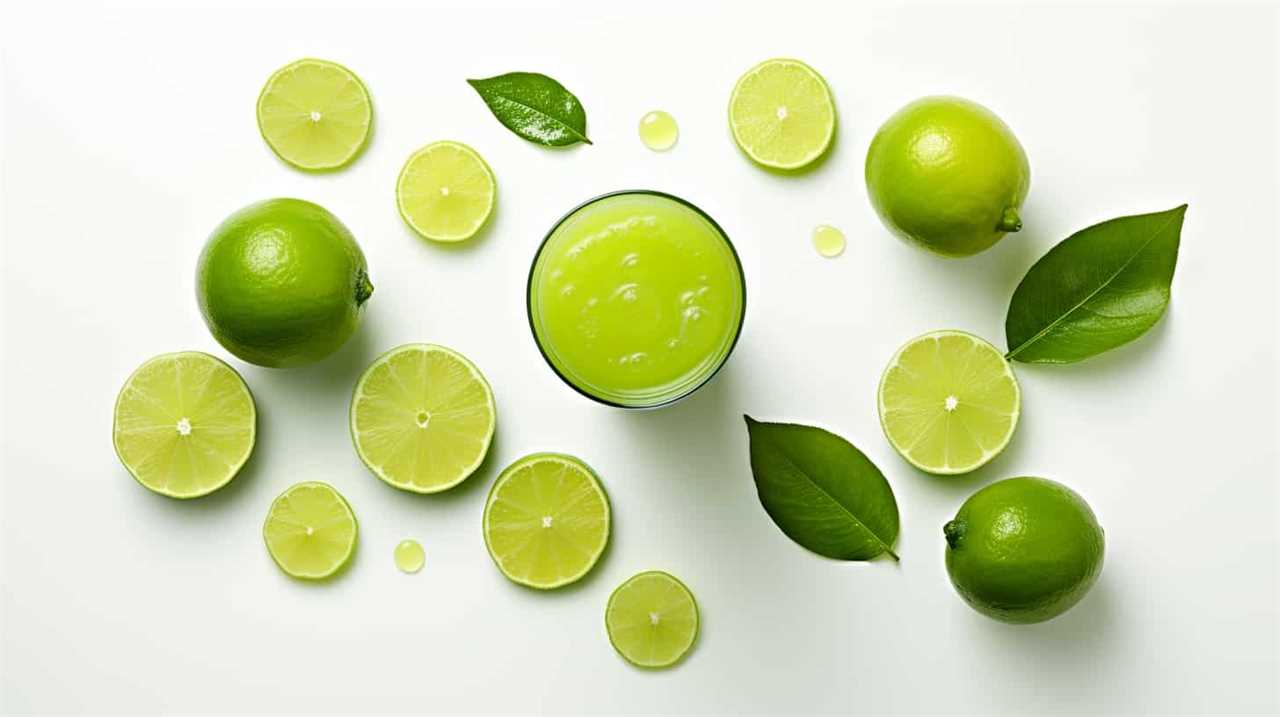
Key Takeaways
- Choose a reputable brand of aloe vera juice that prioritizes quality and uses organic, pure aloe vera.
- Avoid brands that contain added sugars or artificial ingredients.
- Use natural sweeteners like honey, agave syrup, or stevia to enhance the taste of aloe vera juice.
- Experiment with adding fruits, herbs, and other juices to create unique flavor combinations and enhance the health benefits of aloe vera juice.
Choosing the Right Aloe Vera Juice
We can enhance our experience with aloe vera juice by selecting the right brand and type for our preferences. When it comes to finding a reputable brand, it’s important to do some research and read reviews from other consumers. Look for brands that prioritize quality and use organic, pure aloe vera without any added sugars or artificial ingredients. Understanding the health benefits of aloe vera juice is also crucial in making the right choice. Aloe vera is known for its soothing properties, aiding digestion, promoting skin health, and boosting the immune system. By choosing a high-quality brand, we can ensure that we’re getting the maximum benefits from our aloe vera juice.
Now that we know how to choose the right brand, let’s move on to the next step of adding natural sweeteners.
Adding Natural Sweeteners
To enhance the flavor of our aloe vera juice, we can add natural sweeteners such as honey or agave syrup. Using alternative sweeteners not only adds sweetness but also brings unique flavors to the juice. Here are some options to consider:
- Stevia: A natural sweetener derived from the Stevia plant, it’s a zero-calorie alternative to sugar.
- Maple Syrup: This natural sweetener adds a rich and earthy flavor to the aloe vera juice.
- Dates: Pureed dates can be used to sweeten the juice while also providing essential nutrients like fiber.
In addition to using alternative sweeteners, we can enhance the flavor of aloe vera juice by adding spices and extracts. Cinnamon, ginger, or vanilla extract can add warmth and depth to the taste. By experimenting with different combinations of these natural sweeteners, spices, and extracts, we can create a flavor profile that suits our preferences.
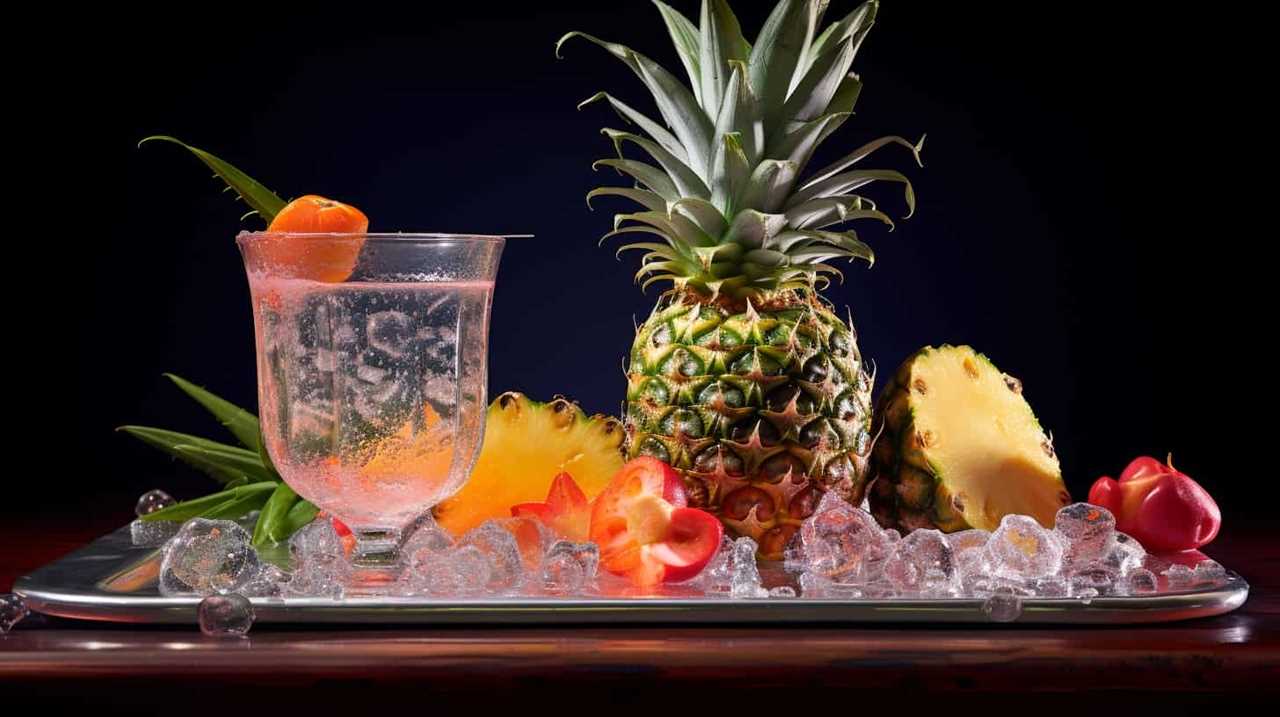
Now, let’s move on to the next section and learn how to infuse aloe vera juice with fruits and herbs to further enhance its taste.
Infusing With Fruits and Herbs
As we explore ways to make our aloe vera juice taste better, one option to consider is infusing it with fruits and herbs. Creating unique aloe vera blends by adding fruits and herbs not only enhances the flavor but also adds a touch of freshness and complexity to the juice.
Fruits like strawberries, pineapple, or citrus can add a burst of sweetness, while herbs like mint, basil, or ginger can provide a subtle yet refreshing twist. Exploring the benefits of herbal infusions can also be beneficial for our health. For example, adding a few sprigs of lavender can promote relaxation and reduce stress. Additionally, infusing aloe vera juice with rosemary can aid digestion and boost the immune system.
Blending With Other Juices
Let’s try mixing aloe vera juice with different fruit juices to create delicious and refreshing blends. Blending aloe vera juice with other fruits not only enhances its taste but also adds nutritional benefits to your drink. Here are three fruit juices that you can mix with aloe vera juice:

- Orange juice: Combining aloe vera juice with orange juice not only adds a tangy flavor but also boosts your intake of vitamin C, which is essential for a strong immune system.
- Pineapple juice: Mixing aloe vera juice with pineapple juice creates a tropical blend that isn’t only refreshing but also helps in digestion. Pineapple contains bromelain, an enzyme that aids in breaking down proteins and promoting better digestion.
- Watermelon juice: Blending aloe vera juice with watermelon juice creates a hydrating and refreshing combination. Watermelon is rich in water content and contains electrolytes that can help replenish your body’s fluids.
Experimenting With Flavor Combinations
While we can try various flavor combinations with aloe vera juice, it’s important to find the right balance to enhance its taste. Experimenting with different flavors can’t only make the juice more enjoyable but also enhance its health benefits.
Aloe vera juice is known for its numerous health benefits, such as boosting digestion, promoting hydration, and supporting the immune system. By adding complementary flavors, we can create a refreshing summer drink that not only tastes great but also provides a nutritional boost.
Some popular flavor combinations include mixing aloe vera juice with citrus fruits like lemon or orange, adding a splash of coconut water for a tropical twist, or combining it with cucumber and mint for a refreshing and cooling effect.
Don’t be afraid to get creative and find the flavor combination that suits your taste buds best!
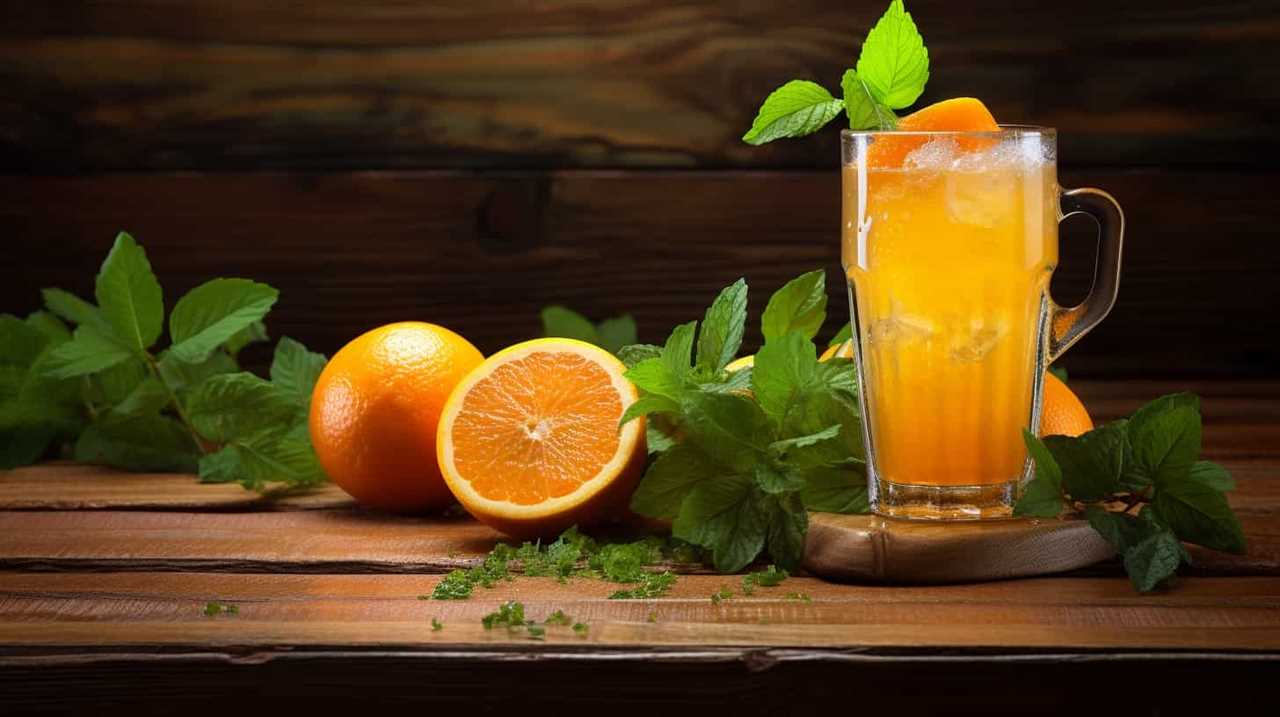
Frequently Asked Questions
Can I Use Store-Bought Aloe Vera Gel Instead of Fresh Aloe Vera for Making Juice?
Yes, you can use store-bought aloe vera gel instead of fresh aloe vera for making juice. However, it’s important to note that fresh aloe vera juice may have more health benefits due to its higher nutrient content.
How Long Can I Store Aloe Vera Juice in the Refrigerator?
Aloe vera juice can be stored in the refrigerator for up to a week. Refrigeration helps maintain the longevity and freshness of the juice, preserving its beneficial properties.
Can Aloe Vera Juice Help With Digestive Issues?
Aloe vera juice can potentially help with digestive issues when taken in appropriate dosages. However, it is important to note that there may be potential side effects. It is always best to consult with a healthcare professional before starting any new supplement regimen.
Can I Use Artificial Sweeteners Instead of Natural Sweeteners in My Aloe Vera Juice?
Using artificial sweeteners in aloe vera juice may affect its taste and potential health benefits. However, natural sweeteners like honey or stevia can enhance the flavor without compromising its nutritional value.

Is It Safe to Drink Aloe Vera Juice Every Day?
Drinking aloe vera juice daily can have numerous benefits, such as improving digestion and boosting the immune system. However, consuming it regularly may also lead to potential side effects like diarrhea or stomach cramps.
Conclusion
In conclusion, making aloe vera juice taste better is easy and enjoyable.
By choosing the right aloe vera juice and adding natural sweeteners, infusing with fruits and herbs, blending with other juices, and experimenting with flavor combinations, you can create a delightful and refreshing drink.
So go ahead and unleash your creativity in the kitchen, and transform your aloe vera juice into a sensational elixir that will transport your taste buds to paradise.
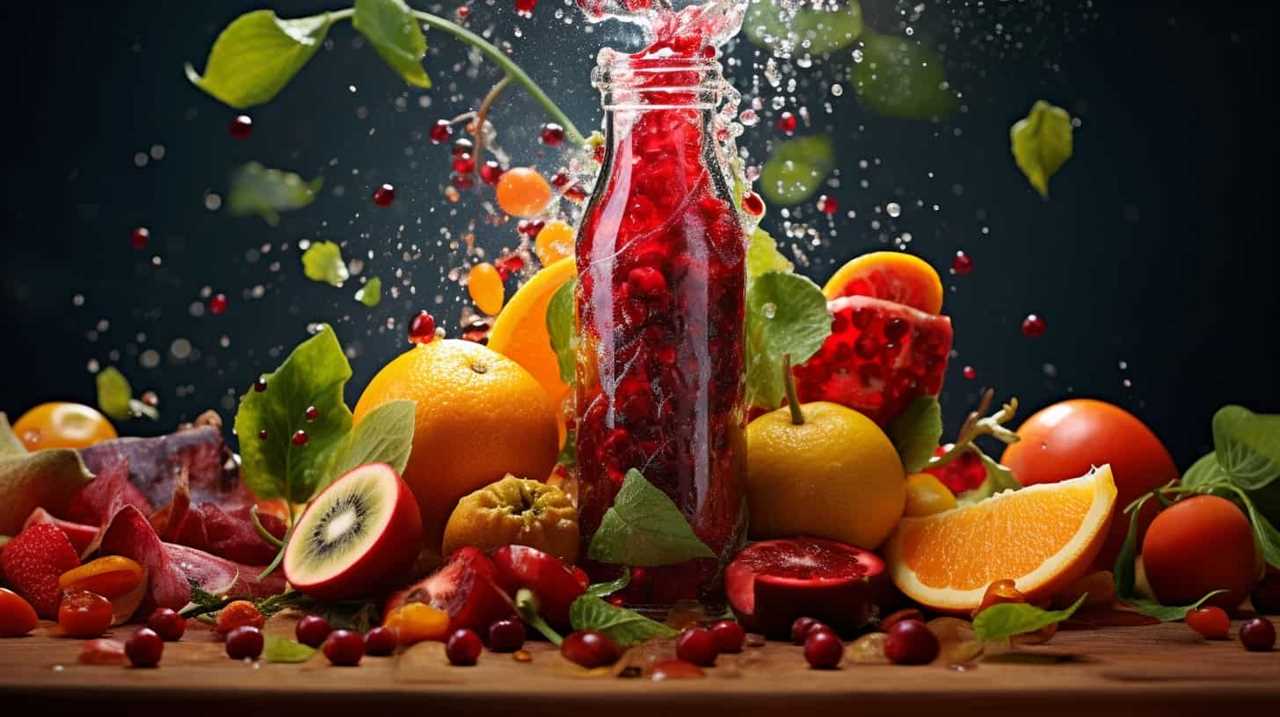
Susannah expertise lies in researching and compiling evidence-based content on juicing, nutrition, and overall health. She is committed to ensuring that The Juicery World offers accurate, up-to-date, and trustworthy information to empower readers to take control of their health. Susannah’s goal is to inspire individuals to embrace juicing as a way to nourish their bodies and live their best lives.
Juice Tips and Tricks
How to Make a Glass of Lemonade With Bottled Lemon Juice
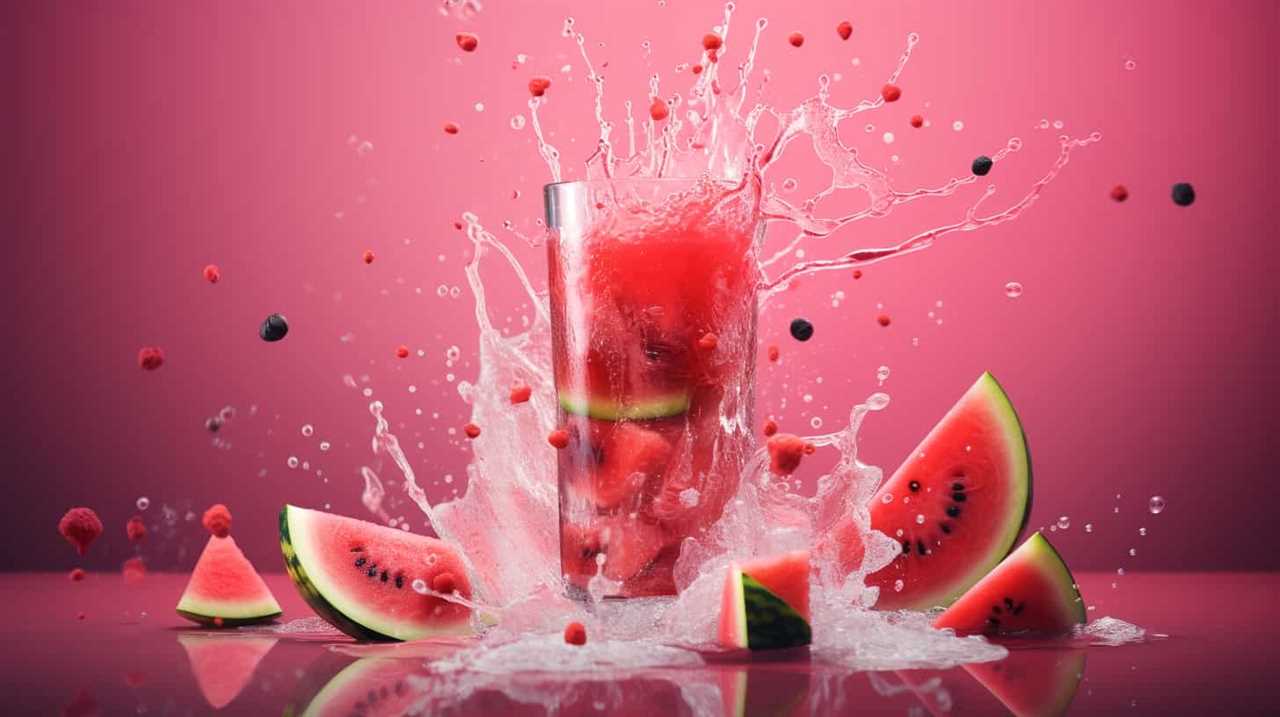
Are you craving a cool glass of lemonade to quench your thirst? Look no further! Try out our perfect recipe using bottled lemon juice that will surely please your taste buds.
In this article, we’ll guide you through the process of creating a tangy and sweet concoction that will leave you feeling refreshed and satisfied.
So grab your ingredients and let’s get started on this delightful journey of serving ourselves and others a glass of pure lemony goodness.
Key Takeaways
- Consider the storage of the bottled lemon juice (dark glass or plastic bottles, protect from light exposure, check expiration date)
- Choose a suitable pitcher and fresh lemons for enhanced flavor
- Store the lemonade concentrate in the refrigerator to maintain freshness
- Adjust the sweetness and tartness to taste with sugar or more lemon juice, and experiment with different sweeteners or additional flavors.
Choosing the Right Bottled Lemon Juice
What are the key factors we should consider when selecting the right bottled lemon juice for our lemonade?

One important factor is how the lemon juice is stored. Look for bottles that are made of dark glass or plastic, as they help protect the juice from light exposure, which can degrade its quality. It’s also important to check the expiration date to ensure freshness.
Another benefit of using bottled lemon juice is convenience. It saves time and effort compared to squeezing fresh lemons. Additionally, bottled lemon juice provides consistent flavor, as the acidity levels are standardized.
When selecting a brand, consider reading reviews and checking for certifications, such as organic or non-GMO.
Gathering the Necessary Ingredients and Tools
How can we gather all the necessary ingredients and tools to make a glass of lemonade with bottled lemon juice?
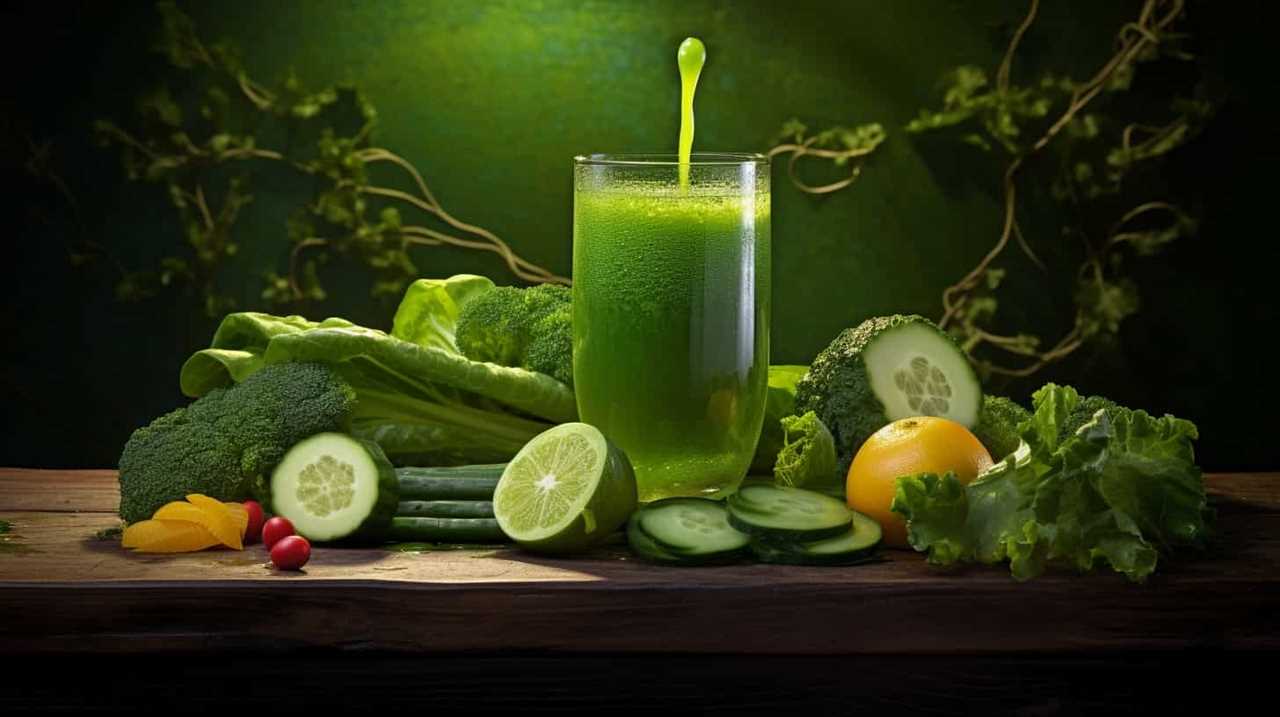
It’s important to start with the right pitcher. Look for a pitcher that’s made of glass or BPA-free plastic, as these materials won’t affect the taste of the lemonade. The pitcher should also have a lid or cover to keep the lemonade fresh and prevent spills.
Now, let’s talk about the lemons. While bottled lemon juice is convenient, using fresh lemons instead can elevate the flavor of your lemonade. Choose lemons that are firm and have a bright yellow color. Give them a gentle squeeze to ensure they’re juicy. To extract the juice, you’ll need a citrus juicer or a reamer. These tools make it easy to get every last drop of juice from the lemons.
Mixing the Lemonade Concentrate
To start mixing the lemonade concentrate, we’ll slowly pour the bottled lemon juice into the pitcher. It’s important to choose the right container for the lemonade concentrate. A pitcher with a lid or a tightly sealed container will help maintain the freshness and prevent any spills or leaks. Once the lemon juice is in the pitcher, we can move on to the next step of adding water and sweetener.
To ensure the lemonade concentrate stays fresh, it’s essential to store it properly. Keep the pitcher in the refrigerator to maintain its cool temperature and prevent any bacteria growth. If you have any leftover concentrate, transfer it to a smaller container with an airtight lid before refrigerating. This will help retain its flavor and prevent any contamination.
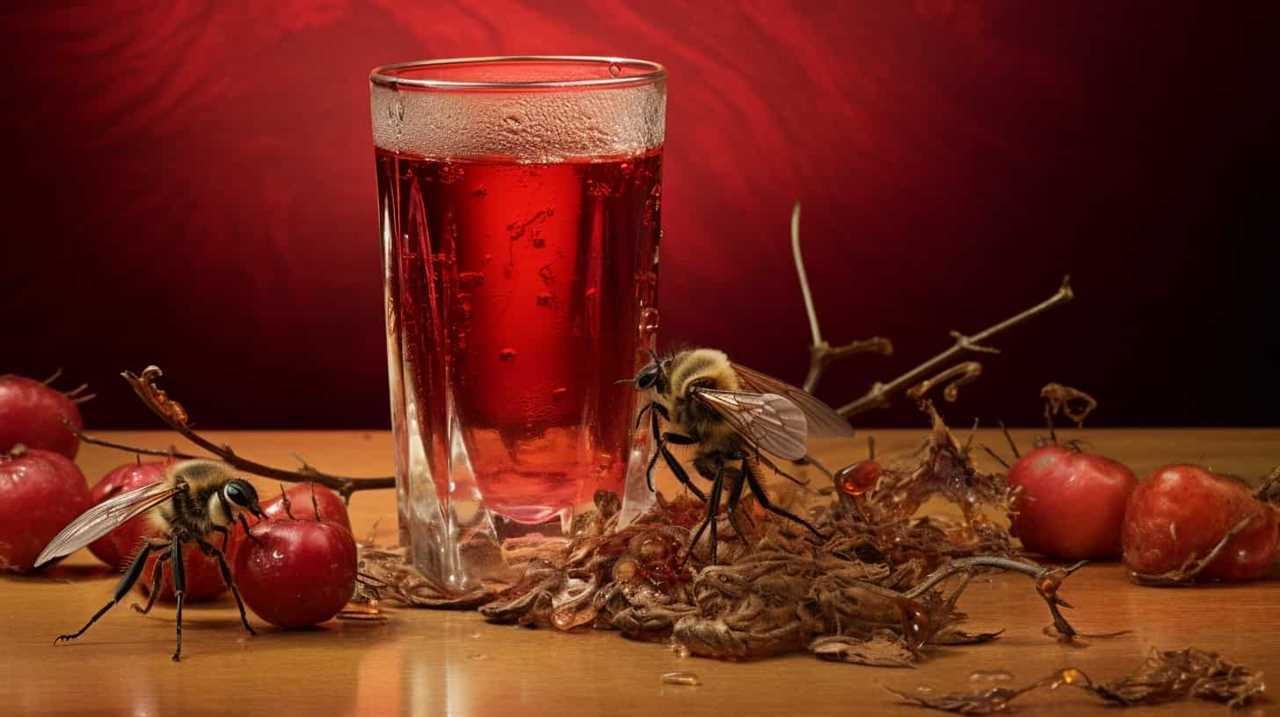
Now that we’ve mixed the lemonade concentrate, it’s time to adjust the sweetness and tartness to taste.
Adjusting the Sweetness and Tartness to Taste
We can adjust the sweetness and tartness of the lemonade to taste by adding more sugar or lemon juice, respectively. If you prefer a sweeter lemonade, simply add more sugar and stir until it dissolves completely. You can experiment with different sweeteners such as honey or agave syrup to find the perfect balance of sweetness.
On the other hand, if you want a tangier lemonade, add more lemon juice gradually, tasting as you go until it reaches your desired level of tartness.
Additionally, you can get creative with your lemonade by adding flavors like fresh mint leaves or a hint of lavender. These additions can elevate the flavor profile and create a more refreshing and unique experience.
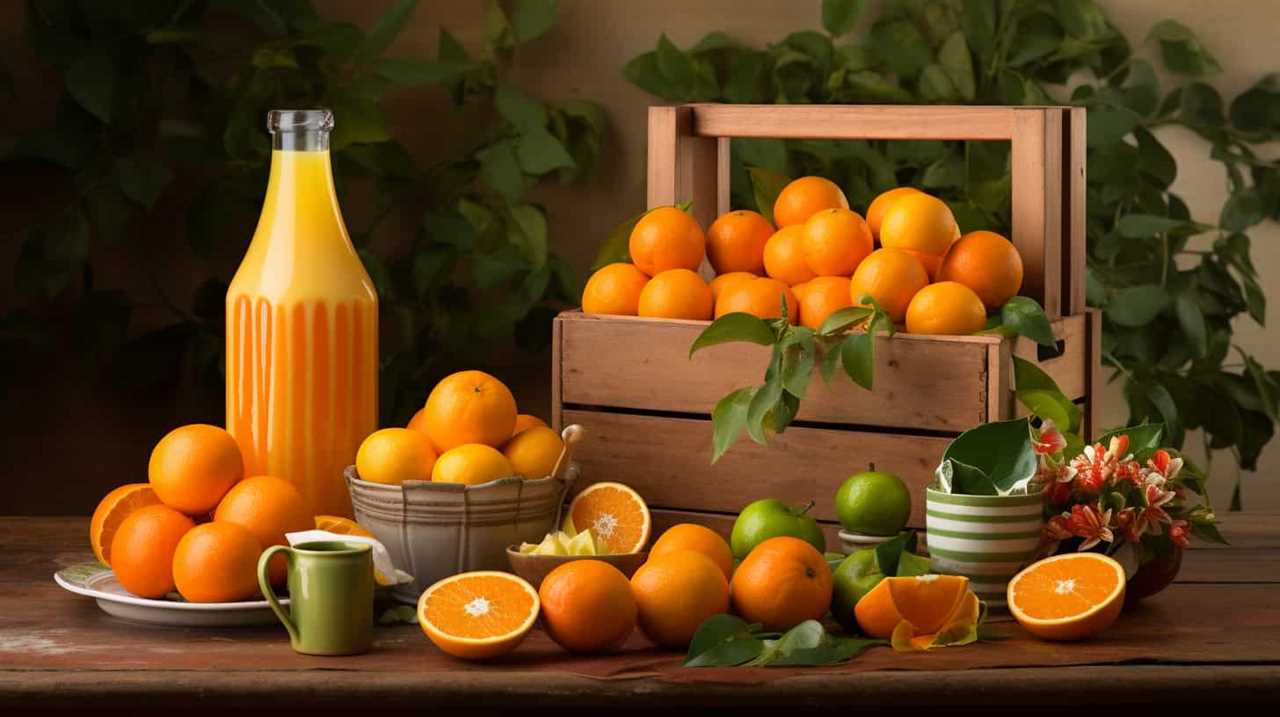
Now that we’ve adjusted the sweetness and tartness of our lemonade, let’s move on to serving and enjoying your refreshing glass of lemonade.
Serving and Enjoying Your Refreshing Glass of Lemonade
Now let’s sit back, relax, and savor our refreshing glass of lemonade.
When it comes to serving and enjoying this delightful drink, there are a few techniques and garnishing options to consider.
Firstly, serving your lemonade chilled is essential for maximum enjoyment. Ensure that you have chilled glasses or add ice cubes to the glasses before pouring the lemonade.

To add a touch of elegance, you can garnish your lemonade with a slice of lemon on the rim of the glass. For an extra burst of flavor, you could also add a sprig of fresh mint or a few berries.
Remember to gently stir the lemonade before serving to evenly distribute the flavors.
Now, take a sip, feel the refreshing tang of lemon, and let the sweet and tart flavors dance on your taste buds.
Cheers!
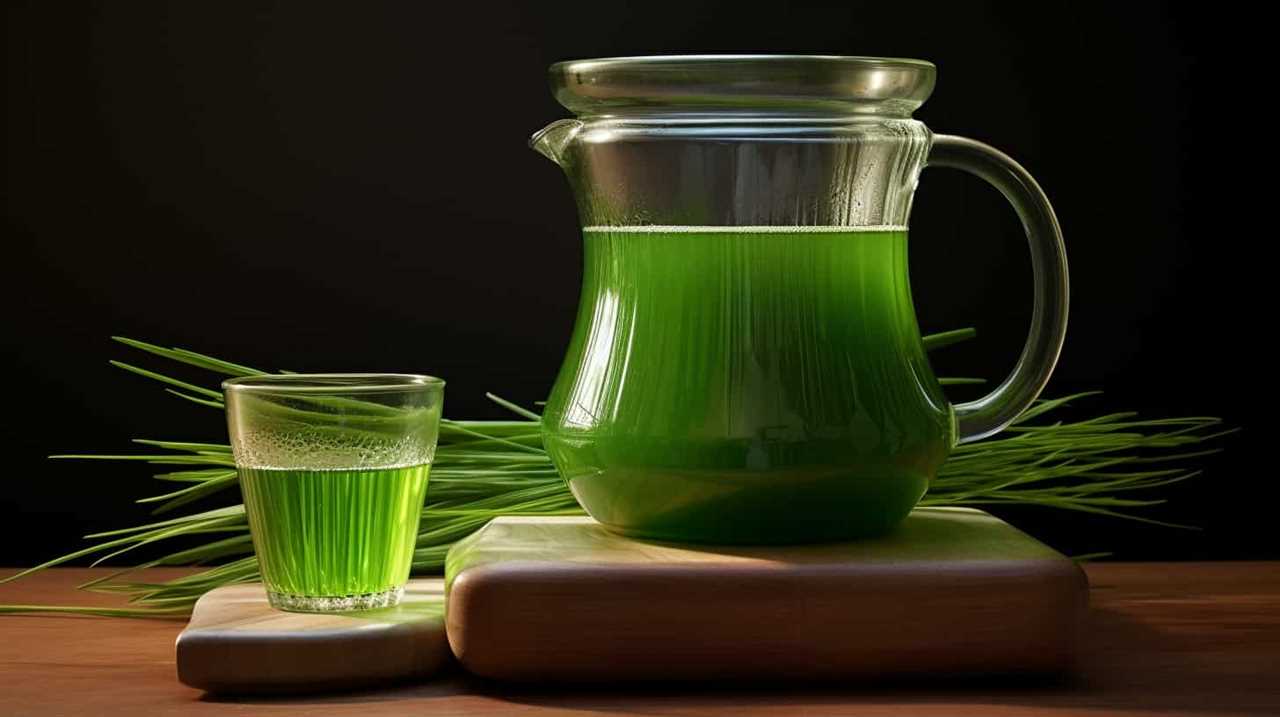
Frequently Asked Questions
Can I Use Fresh Lemons Instead of Bottled Lemon Juice?
Fresh lemons offer numerous benefits over bottled lemon juice. The taste of fresh lemons is unparalleled, providing a vibrant and tangy flavor. Incorporating fresh lemons into your lemonade will elevate its taste and give it a refreshing and authentic twist.
Can I Substitute Sugar With a Different Sweetener?
Substituting sweeteners in lemonade can enhance the flavor and offer health benefits. We’re knowledgeable about alternative sweeteners and can provide precise, detailed instructions on using them in place of sugar.
How Long Does the Lemonade Concentrate Need to Chill in the Refrigerator?
The chilling time for the lemonade concentrate in the refrigerator is typically around 1-2 hours. Using bottled lemon juice offers the benefit of convenience and consistent flavor for a refreshing glass of lemonade.
Can I Add Other Fruits or Flavors to the Lemonade?
Sure, we can definitely add different fruits or flavors to our lemonade. It’s a great way to experiment with unique flavors and create refreshing, personalized drinks. The possibilities are endless!

How Long Does the Lemonade Stay Fresh in the Refrigerator?
Lemonade made with bottled lemon juice can stay fresh in the refrigerator for about 5-7 days. To maximize shelf life, store it in an airtight container and keep it chilled.
Conclusion
And so, with a few simple steps and the right ingredients, a glass of refreshing lemonade is born.
Like a symphony of flavors dancing on your taste buds, this tangy elixir quenches thirst and brings joy on a hot summer day.
Just a sip transports you to a world of citrusy delight, where the sweetness and tartness blend harmoniously.

So go ahead, indulge in the art of lemonade-making and savor every drop of this sun-kissed nectar.
Cheers to the perfect glass of lemonade!
Susannah expertise lies in researching and compiling evidence-based content on juicing, nutrition, and overall health. She is committed to ensuring that The Juicery World offers accurate, up-to-date, and trustworthy information to empower readers to take control of their health. Susannah’s goal is to inspire individuals to embrace juicing as a way to nourish their bodies and live their best lives.
Juice Tips and Tricks
How to Know if Orange Juice Is Bad

We’ve all been in that situation before – reaching for a glass of orange juice and hesitating, unsure if it’s still okay to drink. Fear not! This article will give you the knowledge you need to determine for sure if your orange juice is still fresh or if it’s gone bad.
With a blend of scientific precision and practical tips, we’ll explore color changes, strange smells, off taste, texture changes, and mold or growth that may indicate spoilage.
Let’s dive in and serve ourselves a refreshing glass of certainty!
Key Takeaways
- Color changes in orange juice can indicate a loss of freshness and shelf life extension, but it doesn’t necessarily mean the juice is bad.
- Unusual or off-putting odors in orange juice, such as sour or fermented scents, can be a sign of poor quality.
- An off taste in orange juice, such as sour, bitter, or fermented flavors, suggests that the juice is spoiled.
- Texture changes in orange juice, such as pulp separation or a thicker consistency, can occur as the juice ages, so it’s important to consume it before the expiration date.
Color Changes in Orange Juice
We should be aware that color changes can indicate whether orange juice is bad.
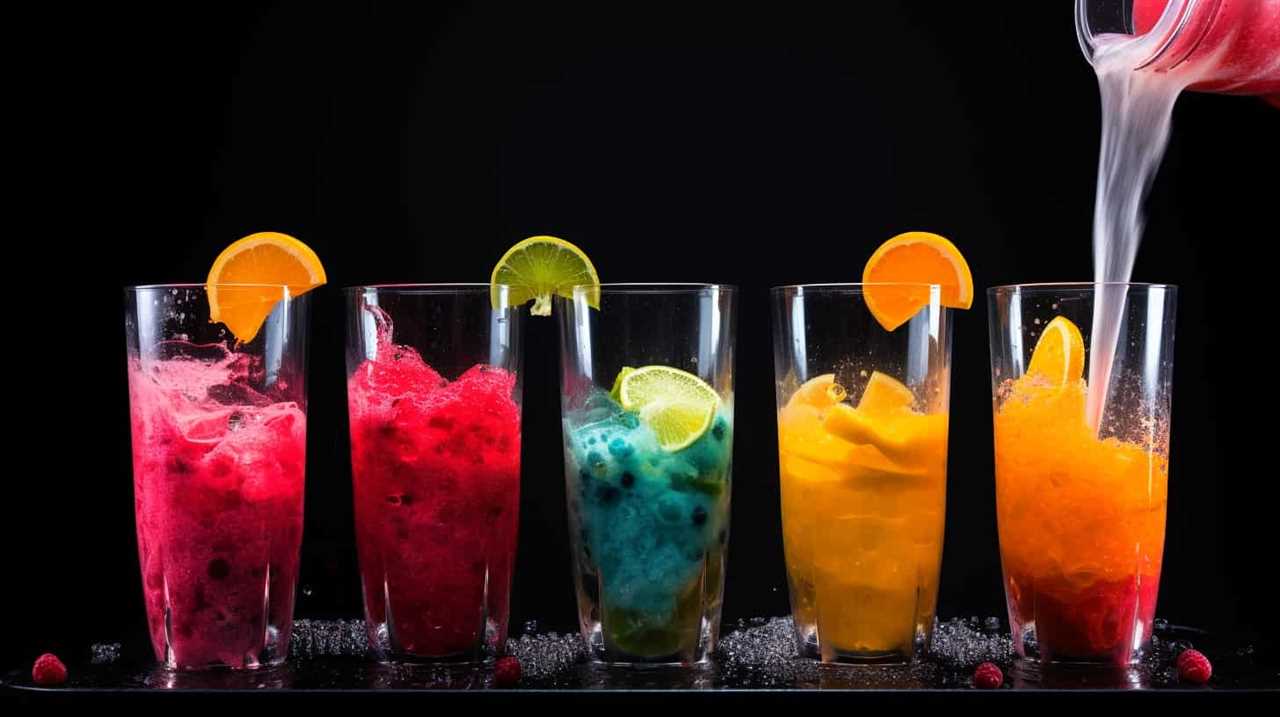
When it comes to orange juice, color is a crucial factor to consider. As oranges are exposed to air, an oxidation process occurs, which leads to changes in color. Fresh orange juice has a vibrant orange hue, indicating its freshness and high nutritional value.
However, as time passes, the juice may undergo a color change, turning dull or brownish. This change in color is a result of the oxidation process, which affects the flavor and quality of the juice. It’s important to note that while a change in color doesn’t necessarily mean the juice is bad, it does indicate that the juice is losing its freshness and shelf life extension.
Therefore, it’s advisable to consume orange juice when it’s at its freshest, as indicated by its vibrant orange color.
Strange Smells in Orange Juice
When it comes to evaluating orange juice, we should be cautious of any strange smells or odors. A fresh, pleasant smell is indicative of good quality orange juice. However, if you notice any unusual or off-putting odors, it may be a sign that the juice has gone bad. These smells can range from a sour or fermented scent to a rancid or moldy aroma.

It’s important to note that while some natural variations in scent can occur due to the specific variety of oranges used, any strong or unpleasant smells should raise concerns. If you have citrus fruit allergies, it’s especially important to pay attention to the smell of orange juice, as it could indicate the presence of spoilage or contamination.
Ensuring the quality of orange juice is essential as it’s a popular beverage known for its health benefits, including being rich in vitamin C and antioxidants.
Off Taste of Orange Juice
Our taste buds can detect even the slightest hint of an off taste in orange juice, which can indicate that it has gone bad. The taste of orange juice should be fresh, tangy, and slightly sweet. If it tastes sour, bitter, or fermented, it’s likely spoiled.
One common cause of an off taste in orange juice is the use of overripe oranges. When oranges become overripe, their flavor profile changes, resulting in a less pleasant taste. Another factor to consider is the expiration date. Orange juice that has passed its expiration date is more likely to develop an off taste. It’s important to check the expiration date before consuming orange juice to ensure its freshness and quality.
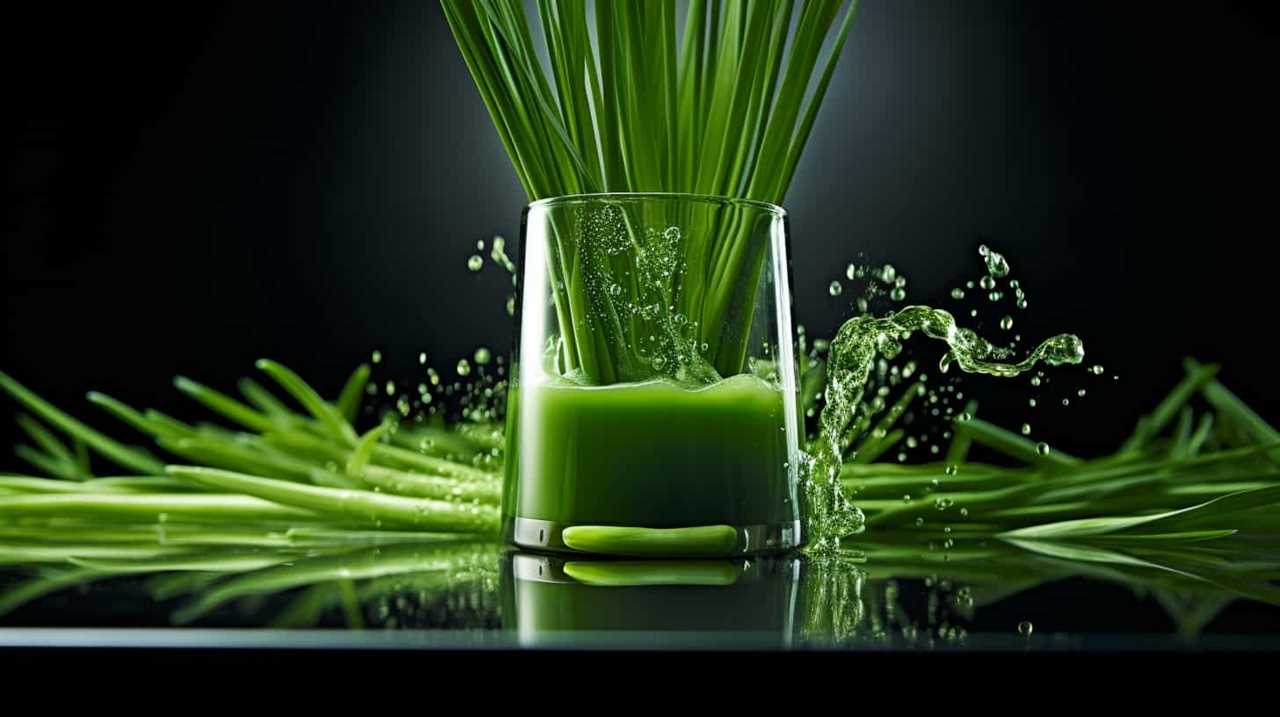
Now, let’s move on to discuss the texture changes in orange juice.
Texture Changes in Orange Juice
As we explore the texture changes in orange juice, it’s important to note that certain factors can cause it to become thicker or develop sediment. One common texture change in orange juice is pulp separation, where the pulp separates from the liquid and settles at the bottom. This can occur naturally over time, as the pulp particles become denser and sink.
Another factor that can affect the texture of orange juice is the expiration date. As orange juice ages, it may start to develop a thicker consistency and even form sediment. This is a result of the natural breakdown of the juice’s components. Therefore, it’s crucial to check the expiration date on orange juice and consume it before it reaches its expiration date to avoid any undesirable texture changes.
Mold or Growth in Orange Juice
We need to be aware of the possibility of mold or other growth occurring in orange juice. Mold can develop in orange juice if it isn’t stored properly or if it has passed its expiration date.
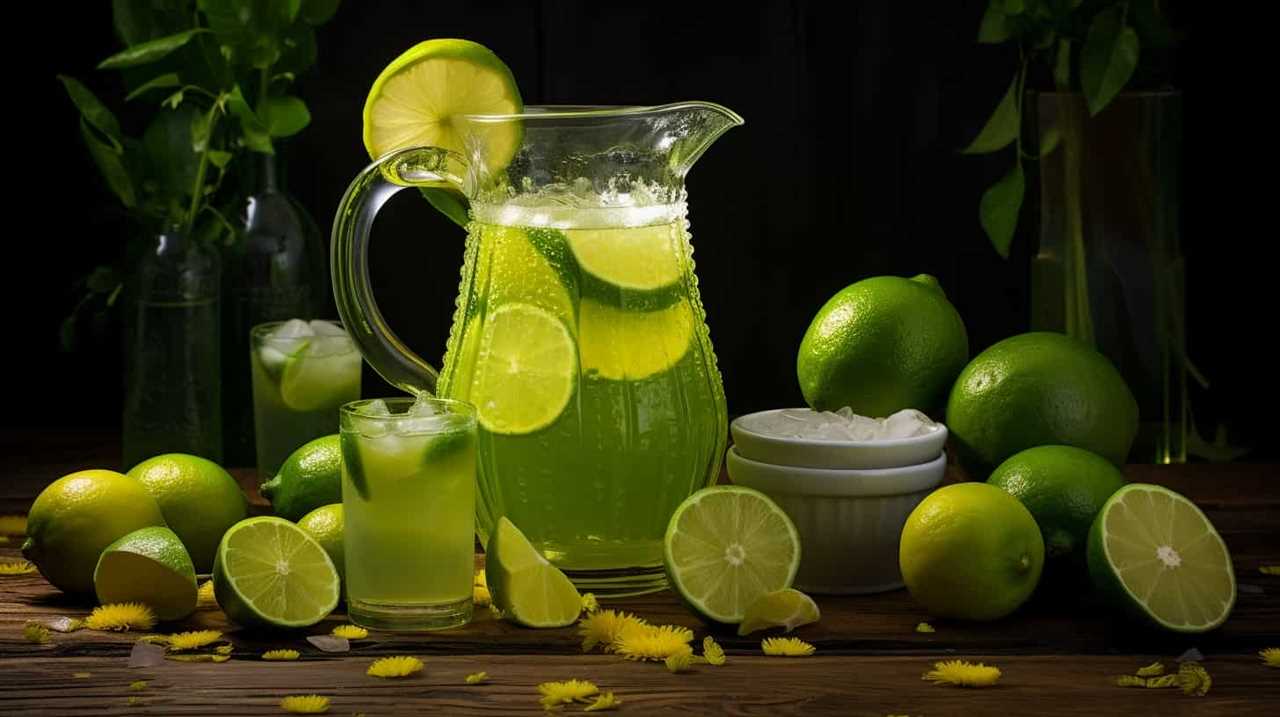
To prevent mold growth, it’s important to follow these steps:
- Store orange juice in the refrigerator at a temperature below 40°F (4°C).
- Check the expiration date on the bottle before consuming. Discard any orange juice that has expired.
- Keep the container tightly sealed to prevent air and moisture from entering, as these can promote mold growth.
Regularly inspecting orange juice for any signs of mold or unusual growth is essential. If you notice any discoloration, a strange odor, or visible mold, it’s best to discard the juice to avoid any potential health risks.
Frequently Asked Questions
Can Orange Juice Go Bad if It’s Stored in the Freezer for Too Long?
Frozen orange juice can potentially lose its nutrients and change its taste if stored in the freezer for too long. It is important to check for signs of spoilage before consuming it.
How Long Can Orange Juice Stay Fresh in the Refrigerator Once It’s Opened?
Once opened, orange juice can stay fresh in the refrigerator for about 7-10 days. To maintain its freshness, store it properly by keeping it tightly sealed and at a consistently cold temperature.
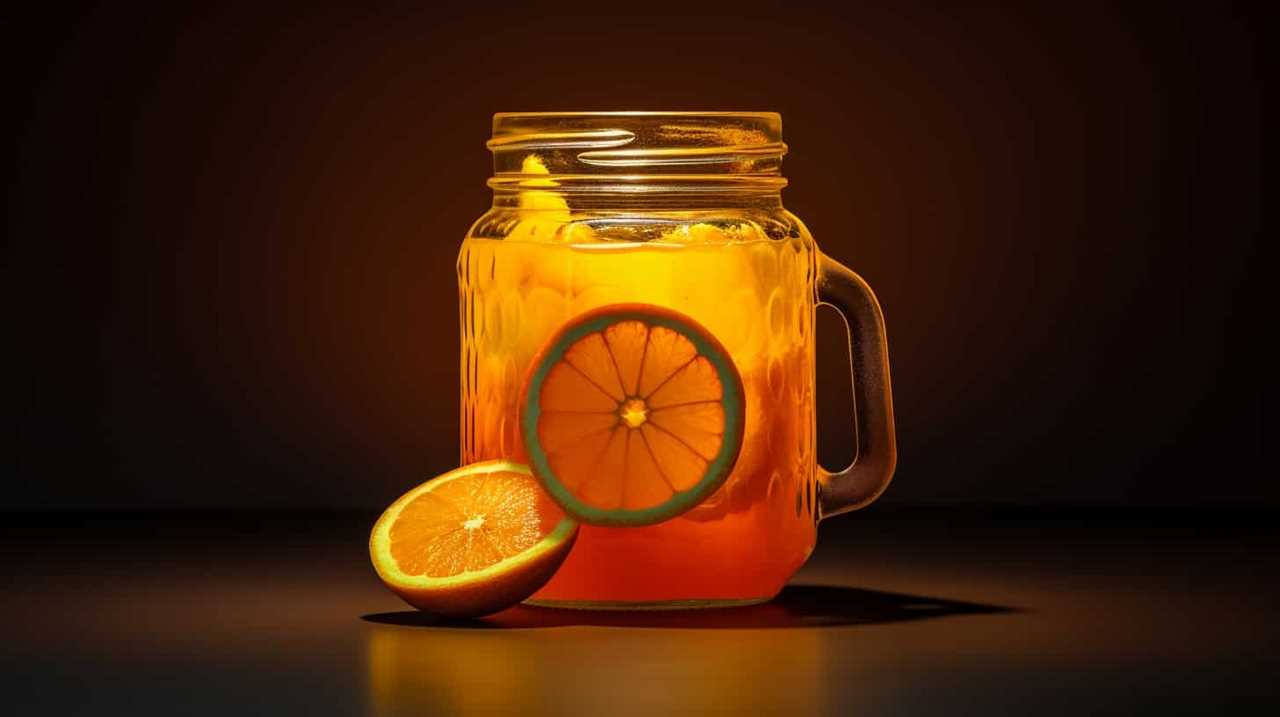
Is It Safe to Consume Orange Juice That Has Been Left Out at Room Temperature Overnight?
Left out orange juice may not be safe to drink as it can harbor harmful bacteria. Signs of spoiled orange juice include a sour smell, mold growth, and a change in color or taste.
Can Orange Juice Develop Harmful Bacteria if It’s Past Its Expiration Date but Still Looks and Smells Fine?
Orange juice can cause food poisoning if it develops harmful bacteria, even if it looks and smells fine. Signs of spoiled orange juice include a sour smell, mold growth, and a change in color or taste.
Does the Nutritional Value of Orange Juice Decrease as It Starts to Go Bad?
As orange juice goes bad, its nutritional value decreases. The longer it sits on the shelf, the more nutrients it loses. Signs of spoilage include a sour smell, off taste, and mold growth.
Conclusion
In conclusion, determining if orange juice is bad requires careful observation of color changes, strange smells, off taste, and texture changes. Just like a detective investigating a case, we must rely on our senses to detect any signs of spoilage.
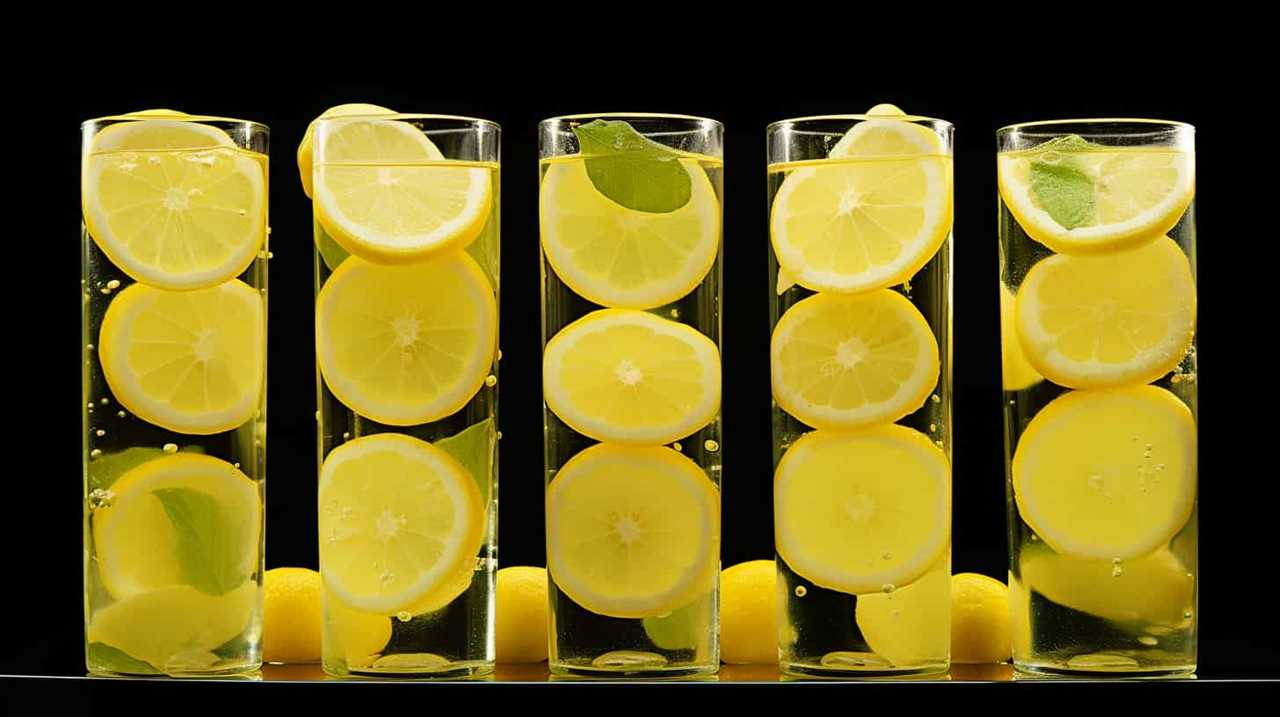
If we detect mold or growth in the orange juice, it’s a clear indication that it’s no longer safe to consume. By remaining vigilant and attuned to these indicators, we can ensure that our orange juice is always fresh and enjoyable.
Susannah expertise lies in researching and compiling evidence-based content on juicing, nutrition, and overall health. She is committed to ensuring that The Juicery World offers accurate, up-to-date, and trustworthy information to empower readers to take control of their health. Susannah’s goal is to inspire individuals to embrace juicing as a way to nourish their bodies and live their best lives.
-

 Juice Tips and Tricks3 months ago
Juice Tips and Tricks3 months agoHow Much Lemon Juice Is Equal To Half A Lemon
-

 Juice Tips and Tricks3 months ago
Juice Tips and Tricks3 months agoHow Much Lemon Juice Concentrate Equals One Lemon
-

 Juice Tips and Tricks3 months ago
Juice Tips and Tricks3 months agoHow Long Can You Drink Orange Juice After The Expiration Date
-

 Fruit Juice Varieties2 months ago
Fruit Juice Varieties2 months agoTop 11 Most Loved Fruit Juice Varieties
-

 Juice Tips and Tricks3 months ago
Juice Tips and Tricks3 months agoHow Much Lemon Juice Is Equivalent To 1 Lemon
-

 Organic and Natural Juices2 months ago
Organic and Natural Juices2 months ago8 Best Organic Brands for Fruit Juice
-

 Juice Tips and Tricks3 months ago
Juice Tips and Tricks3 months agoHow Much Lemon Juice Is Equivalent To One Lemon
-

 Juice Tips and Tricks3 months ago
Juice Tips and Tricks3 months agoHow Long Do You Need To Drink Pineapple Juice Before Oral






